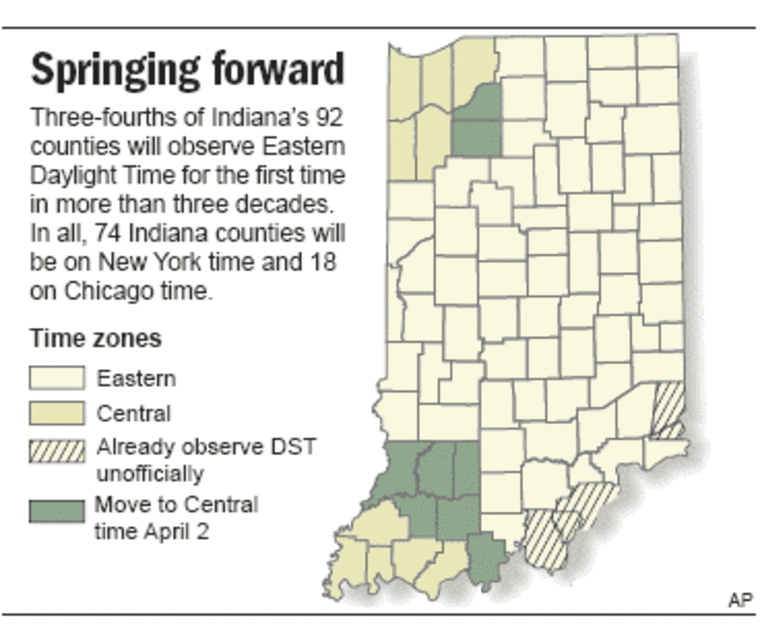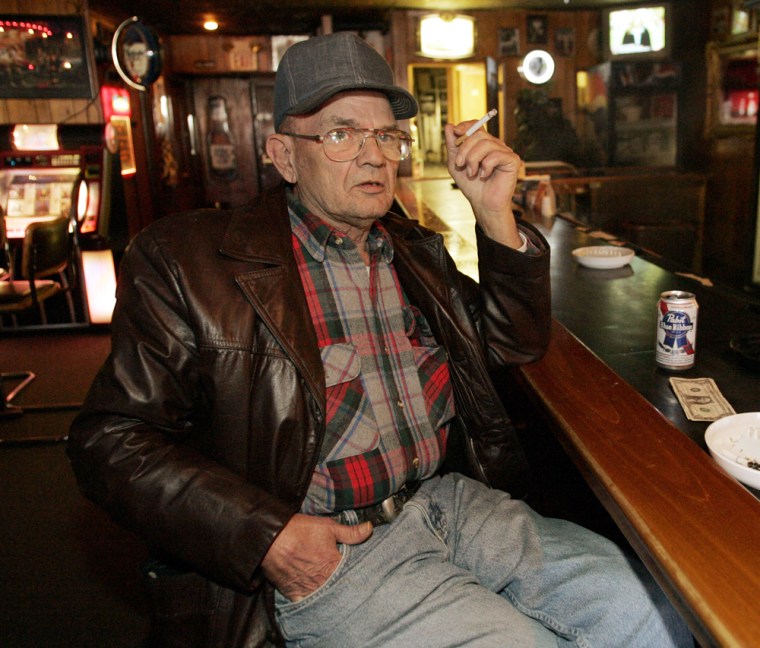Seven months a year, Deano’s Tavern cashes in on Indiana’s refusal to observe daylight-saving time. Ohio residents whose bars close at 2:30 a.m. can go four miles up the road to Deano’s for another hour of drinking before last call.
“That worked out pretty good for us,” said Scott Cline, a bartender at the pub in this community of about 600 residents on the Indiana-Ohio line.
That advantage will disappear after Sunday, when Indiana begins observing daylight-saving time statewide for the first time in more than 30 years.
The change, approved by lawmakers last year, makes Indiana the 48th state to observe daylight time; Hawaii and most of Arizona are the only holdouts.
But the shift, coupled with a U.S. Transportation Department decision allowing eight of the state’s 92 counties to change to the Central time zone, has left many in this state confused and uneasy.
Movie theater owners say the extra hour of evening daylight will hurt business. The Indianapolis 500 changed its start time to 1 p.m. Eastern Daylight Time, but tickets mailed for the race say it begins at noon Eastern Standard Time. And businesses statewide are scrambling to reset computer clocks, which had been specially programmed for “Indiana time.”
“I’d just rather put it on one time and never have to change anything,” said Bob Duckett, a retired millwright who stopped in at Deano’s.
Ignored daylight-saving time since 1970s
Many Indiana residents have never changed their clocks. Under state law, most of Indiana has ignored daylight-saving time since the early 1970s.
The result has been a patchwork of time zones, with 77 counties observing Eastern time but not changing clocks; five on Eastern time unofficially observing daylight-saving time; and 10 on Central time that observed daylight-saving time.

The clock confusion made the state the butt of jokes and even provided a plotline for television’s “The West Wing.”
Gov. Mitch Daniels pushed daylight time last year, saying it would end the confusion and promote commerce. Lawmakers passed the measure by a single vote.
Instead of resolving the matter, the vote created a new debate over which time zone Indiana should observe. Eighteen counties asked the Transportation Department to put them in the Central time zone to be aligned with Chicago. The government granted the requests for eight counties, putting a total of 18 on Central time and 74 on Eastern.
In Pulaski County, the switch to Central might be in name only.
Starting next week, it is changing the work hours for most county employees from 8 a.m. to 5 p.m. EST to 7 a.m. to 4 p.m. CT. Others in the county, such as Pulaski Memorial Hospital, plan to observe Eastern time.
Richard Mynark, the hospital’s chief executive, said the hospital has a large home health department that serves people in the Eastern time zone. The hospital also has a lot of specialty doctors who come to the hospital from out of the county — most of them from the Eastern time zone.
“I prefer not to confuse their schedules and make things tougher for them,” Mynark said.
Bars, restaurants given grace period
The governor tried to clear up some confusion Thursday, when he granted bars and restaurants a one-day reprieve on their clock changes. Indiana liquor regulators had said bars and restaurants would have to move clocks forward at 2 a.m. Sunday and immediately stop serving alcohol, but Daniels said they could wait until the end of business.
The only sure thing about Indiana’s time debate is that it will continue long after the state springs forward.
Pulaski and Martin Counties already want to move back to Eastern time, contending many businesses will be hurt, and they hope neighboring counties join the movement.
Martin County Commissioner John Collins, who works in construction, said he personally would be satisfied with either time zone. But he is frustrated that residents and visitors will need to study a map to figure out the correct time.
“It’s a mess,” he said.
